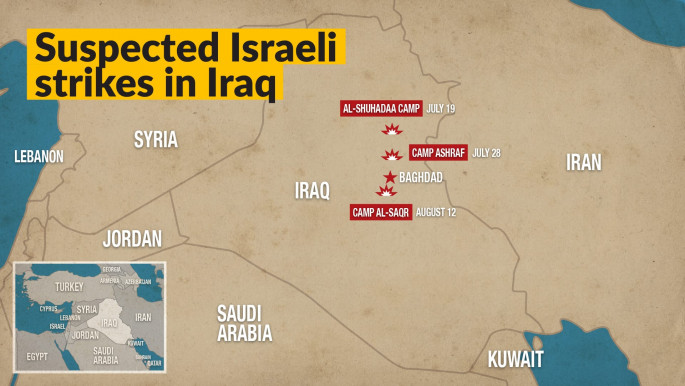Iraq confirms Israel behind 'some' Shia militia base attacks: MP
The Hashed has blamed both Israel and the US for a string of blasts and drone sightings at its bases in recent weeks, but Baghdad has thus far refrained from making accusations.
Ahmad al-Assadi, a Hashed official and spokesman for its parliamentary bloc "Fatah", told journalists on Thursday in his office in central Baghdad that government probes would name Israel.
"Some of the government investigations have reached a conclusion that the perpetrator behind some of the attacks is absolutely, certainly Israel," he said, declining to provide details on the evidence.
"The government is preparing sufficient evidence and documents to complain to the (UN) Security Council. It won't submit a complaint against an unknown entity." 
The Hashed was established in 2014 from mostly-Shia armed groups and volunteers to fight the Islamic State group and is now formally part of Iraq's armed forces.
But the US and Israel fear some units are an extension of their arch-foe Iran and have been equipped with precision-guided missiles that could reach Israel.
Since mid-July, five Hashed arms depots and training camps have been targeted in apparent attacks.
The group said it had also fired at surveillance drones over two other bases.
Hashed top officials have said the US is broadly "responsible" but specifically blamed Israeli drones for the latest strike on Sunday, which killed a Hashed fighter near Iraq's western border with Syria.
The Pentagon has denied responsibility and said it is cooperating with Iraq's investigations, but Israel has neither confirmed nor denied its role.
Assadi told reporters the US involvement remained unclear, dulling the group's earlier accusations.
"Israeli planes supported by the US? We can't make that accusation. Did America give a green light? We can't make that accusation," he said.
But, he added, the Hashed had been expecting an attack amid rising US-Iranian tensions since Washington withdrew from the landmark nuclear deal with Tehran last year.
The US has since imposed tough sanctions on Iran's top officials, its energy and financial sectors, as well as a host of Iraqi, Lebanese and Palestinian firms and people allegedly tied to Tehran.
"Are the attacks that happened surprising for the Iraqi government, the Hashed, or other factions? Of course not," Assadi said.
"It's clear. The Hashed is being specifically targeted."
Warnings
Earlier this week, an Iraqi militia threatened to attack US forces in the country unless President Donald Trump orders a withdrawal, local reports said.
The group called Jund al-Imam al-Hujja released video that was revealed by Iraqi-Kurdish media channel Rudaw on Tuesday, when armed masked men demanded Trump to pull out American troops or face bloody consequences.
"We promise to attack every single US civil and military base within Iraq if Trump does not withdraw them," the men said.
"The US troops are invaders of Iraq, and we will not rest until we expel the US invaders."
A portrait of militia leader Muqtada Al-Sadr and the cleric-turned-politician's grandfather, Mohammad Sadeq al-Sadr.
The militants pledged to carry out a similar strategy of Mohammed Sadiq al-Sadr, the rebel cleric who founded the pronominally Shia Dawa Party and was executed by the Saddam Hussein regime in 1980.
Muqtada al-Sadr heads the Saraya Brigades militia, which is part of the Popular Mobilisation Forces (PMF), or Hashd al-Shaabi, paramilitary coalition.
"It [Israel] knows [the Iraqi] response will be seismic to its security and influence. The Zionists know their end will come from Iraq," Sadr said in a statement on Monday.
Sadr led a militia that carried out attacks against American troops after US troops following their occupation of Iraq in 2003 and government forces.
US forces withdrew from the country but re-entered at the request of the Iraqi government following the 2014 rise of the Islamic State group.
US military bases in Iraq and the embassy in Baghdad have been targeted by militias in recent months by suspected Shia militias.
Follow us on Twitter: @The_NewArab



